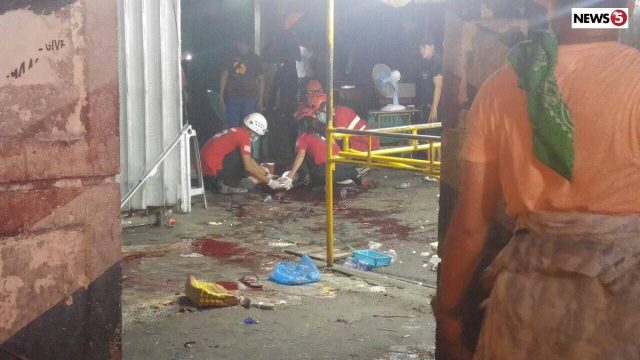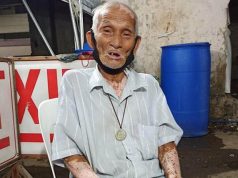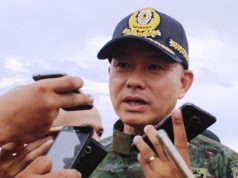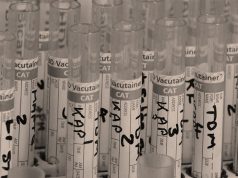MANILA – Amid a supposed claim by the Islamic State of Iraq and Syria (ISIS) that it was behind the pipe-bomb explosion in Quiapo district, the head of Metro Manila’s police force declined comment and stuck to the initial theory that the blast was the result of a gang war.
Police Director Oscar Albayalde, NCRPO Regional Director, said Sunday that from “evidence we have on hand on the explosion (testimonies from witnesses and physical evidence recovered from the crime scene), there is nothing to indicate or show that the Quiapo explosion is connected with any terrorist or threat group.”
Albayalde added: “We maintain that this incident is nothing but a local peace and order concern involving feuding gangs or persons in the Quiapo area.”
Albayalde reacted to reports quoting the SITE Intel Group that the ISIS had owned Friday’s blast which happened as Manila was hosting the 30th ASEAN Summit under the tightest of security. SITE Intel referred to the ISIS’ Amaq News Agency as basis for its report.
Pipe bomb not usual in gang wars
Analysts had noted also that if what happened was simply a gang or clan war or a “rido” – sparked by the mauling of a male teenager whose father was retaliating – it was unlikely that the perpetrator would make a pipe bomb, which requires special skills and is associated with many terrorist attacks abroad.
Nonetheless, Albayalde stuck to the earlier theory ruling out terrorism: “It is our resolve at the NCRPO to thwart any incident that may disrupt the peace and order in our region especially during the advent of our ASEAN hosting. We have always taken steps to ensure that your police force is ready to respond for any eventualities. In the past we have not discounted the presence of threat groups in the metropolis. However, we will not comment on the alleged ISIS claim on the Quiapo explosion until we confirm with certainty that such claim was really made by them. So much so there are no confirmed reports on any presence of members of ISIS in the country.”
The NCRPO chief pointed out that the area in Quiapo where the violence occurred had in the past been the site of “several similar incidents.”
The ISIS, he added, was also in an apparent propaganda mode – a possibility acknowledged by Prof. Rommel Banlaoi, international expert on peace, violence and terrorism. It is possible the ISIS might be claiming attacks left and right around the world in order to cover up for its setbacks as it is driven out by multinational coalitions from its enclaves in Iraq and Syria, Banlaoi conceded. Still, Banlaoi said in a radio interview Sunday, a pipe bomb is not usually associated with ordinary gang wars, and it is unwise for probers to totally abandon the terror angle.
Albayalde pitched the angle that ISIS was merely engaged in cyber-propaganda: “It would also appear, that again, as in several instances of acts of violence or disruption of peace and order in other countries, the ISIS is grabbing the opportunity to promote their cause and interest, and gain global recognition by claiming outright responsibility for the said explosion.”
Albayalde gave assurances that “we shall remain vigilant while we encourage the public to remain calm but vigilant and help us by providing vital information via our hotlines.”
Crowded area
The blast injured 14 people as it tore through a crowded part of Quezon Avenue late Friday (April 28).
Some victims lost their limbs, and eight remain in hospital.
Survivor Alvin Valilla said he was following his daily routine at the nearby “perya” [small town carnival] where many people were placing bets at the time of the explosion.
“Ayun po, natataranta na po sila. Yung iba po nagliparan na, puro dugo na po sa paligid,” Valilla recalled.
Besides Valilla, police identified the victims as: Rolando Gubat, Ramon Carious, Armando David Jr, Ruiz Convicto Jr, Amado Flores, Migiene Lopez, Patrick Bagnes, Clarissa Macaspac, Wilfredo Tumangan, Mayvelyn Olipas, Reynaldo Cabanilla, and Pepito Enriquez.
PNP chief Ronald dela Rosa said earlier a home-made pipe bomb using “low explosives” such as those used in firecrackers and pyrotechnics was involved in the Quiapo blast.
According to police reports, a 14-year-old Muslim boy was ganged up on by three brothers identified only as Alyas Bebot, Tangki and Komang Kuhulugan as they were playing a local game of chance called “color games.” The boy’s father was enraged and vowed to get even with the players who beat up his son.
“May nakapagsabi na mayroon daw ongoing gang war dito two days ago, at nagbanta daw yung isang grupo; bale yung nabugbog or what, na papasabugin nila ang lugar na ito [People said there was a gang war two days ago and the group of the mauling victim vowed to blow up the place],” said dela Rosa.
Probers from Quiapo’s Barbosa police station on Saturday invited for questioning the 14-year-old mauling victim to get a statement from him and ascertain his father’s whereabouts.
Police Senior Supt. Napoleon Coronel, district director of the Manila Police District, said probers are still following up certain leads “to identify the possible person of interest or even suspects, depending on the information that we will gather.”
Police are also reviewing the CCTV that showed two men approach the blast site moments before the explosion.










